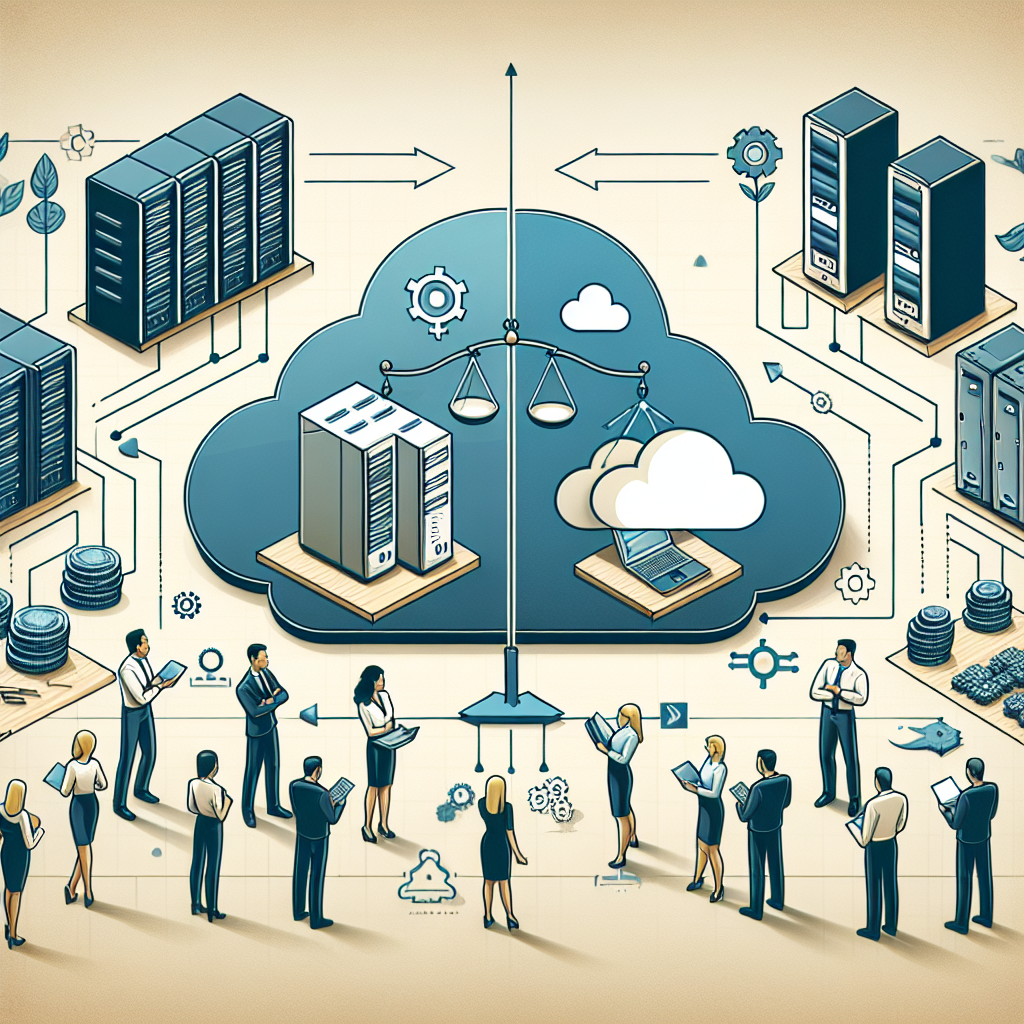Experience the Power of Cloud and Virtual Servers: Discover the Differences and Benefits of Cloud VPS and Virtualization Solutions

What is the Difference Between Cloud and Virtualization? ⭐

When considering your businesss IT infrastructure, understanding the difference between cloud and virtualization is crucial. Both concepts are frequently employed to optimize operations, but they serve different purposes and offer unique benefits. Lets break it down!
The Basics of Cloud and Virtualization ☁️
Cloud computing refers to services and resources that are delivered over the internet. It enables users to access and store data on remote servers rather than local devices. Virtualization, on the other hand, involves creating virtual versions of physical hardware. One common type is a virtual server, which allows multiple virtual machines (VMs) to run on a single physical server.
Key Differences You Should Know ⭐
| Aspect | Cloud | Virtualization |
| Resource Access | On-demand, anywhere | Local or remote physical hardware |
| Scalability | Highly scalable | Limited by hardware |
| Cost Structure | Pay-as-you-go | Upfront investment |
| Management | Service provider managed | User managed |
| Deployment Speed | Quick deployment | Time-consuming setup |
| Use Cases | Dynamic workloads | Stable environments |
| Examples | AWS, Google Cloud | VMware, Hyper-V |
| Data Redundancy | High availability | Subject to server failure |
| Accessibility | From any device | Requires network setup |
| Security | Provider-level encryption | User-configurable security |
Now, let’s delve deeper with a practical example. Imagine you are a start-up experiencing rapid growth. Utilizing a cloud service allows for swift scaling, letting you easily increase or decrease resources as needed without the hassle of physical hardware upgrades. In contrast, if you opt for a virtual server, you must focus on configuring hardware first, which might slow down your operations.
Cost Implications ⭐
Its also essential to consider cost. You might wonder, how much does it cost to rent cloud servers? Pricing can vary significantly based on the providers, ranging from €50 to over €1200 depending on the resources you require. This pricing model can lead to cost savings in the long run, especially if your workload fluctuates.
Real Client Scenarios ⭐
Let’s share a couple of real stories from our clients to highlight these differences. A local e-commerce store faced challenges during the holiday rush, experiencing increased traffic than ever before. By switching to a cloud infrastructure, they managed to handle the spike without downtime. If they were running on a virtualized setup, they might have experienced crashes due to hardware limits.
In another case, a small law firm was managing their IT services in-house through virtualization. However, when they decided to switch to cloud computing, they saw a dramatic reduction in IT overhead costs, allowing them to focus more on client service instead of server management.
Conclusion and Next Steps ⭐
Understanding the difference between cloud and virtualization helps in making informed decisions for choosing the right services for your business. Our experienced specialists at nexrilo.com can help you navigate these options effectively!
If you’d like to explore these services or learn more about what is the purpose of virtualization, give us a call at [email protected]! We offer tailored solutions to meet your specific needs and guarantee professional support for all your IT projects. ⭐ You can also visit our website at nexrilo.com to sign up or get more information.
Frequently Asked Questions ⭐
-
What is the difference between cloud and VPS?
Cloud is scalable and accessible anywhere, while VPS is a specific virtualization setup on one server. -
What is the difference between cloud VPS and regular VPS?
Cloud VPS offers flexibility and resources from multiple servers, whereas regular VPS is limited to a single server. -
What is the difference between cloud and virtual server?
Cloud servers provide on-demand resources online, while virtual servers replicate hardware using virtualization software. -
How does virtualization improve business efficiency?
It maximizes hardware usage and allows quick deployment of applications. -
Can cloud applications be virtualized?
Yes, both can work together, utilizing virtual machines for cloud services. -
Is cloud security better than virtualization security?
Often, yes; cloud providers invest in enhanced security measures. -
How can businesses determine which to use?
Assess your resource needs and scalability requirements to make the best decision. -
What are the maintenance costs for cloud vs virtualization?
Cloud services typically have lower maintenance costs since the provider manages it. -
Does cloud service offer backup solutions?
Yes, most cloud services come with built-in backup options for data protection. -
What should I choose for fluctuating workloads?
Cloud solutions are ideal for businesses anticipating fluctuating resource needs.
Understanding the Purpose of Virtualization: Why It’s a Game-Changer for Modern Enterprises ⭐

When it comes to IT infrastructure, virtualization is not just a buzzword—its a revolutionary approach thats transforming how organizations operate. But what is the real purpose of virtualization? Let’s dive into this powerful concept that can significantly benefit your business!
What is Virtualization? ⭐
At its core, virtualization refers to the creation of virtual versions of physical hardware or resources. This can include servers, storage devices, and networks, allowing companies to run multiple operating environments on a single machine. Imagine fitting several cars into a single parking spot—virtualization optimizes resource utilization in much the same way!
The Key Benefits of Virtualization ⭐
- Cost Efficiency: Virtualization helps reduce hardware costs by allowing multiple virtual machines (VMs) to run on a single physical server. This capitalizes on underutilized resources, leading to significant savings on hardware investments. ⭐
- Enhanced Flexibility: With virtualization, you can quickly allocate resources based on demand. If your business experiences a sudden spike in activity, adjusting resources is as easy as a few clicks. This flexibility is crucial for meeting various business needs. ⭐
- Improved Disaster Recovery: Virtualization simplifies the backup and recovery process. In the event of a failure, restoring a virtual environment is quicker and more efficient than traditional methods, ensuring minimal downtime. ⭐
- Isolation: Different workloads can be isolated from one another, allowing for better security. For instance, if a test application fails, it doesnt compromise critical operations running on another VM. ⭐️
- Streamlined Management: Centralized management tools make it easier to monitor, update, and maintain your virtual infrastructure, reducing IT overhead. ⭐
Real-World Examples of Virtualization in Action ⭐
Let’s consider a mid-sized financial company that was overwhelmed with maintenance costs and downtime from their legacy systems. By implementing virtualization, they managed to consolidate their servers from 20 down to just 5 physical machines. This not only brought down costs significantly but also enhanced performance, allowing them to process transactions faster. ⭐
Another example involves a growing e-commerce business that faced fluctuations in traffic. By utilizing virtualization, they easily scaled their operations during peak seasons without investing in additional physical hardware. This agility allowed them to focus on their growth without worrying about infrastructure constraints. ⭐
Statistics Showcases the Impact ⭐
Here are a couple of statistics that highlight the powerful impact of virtualization on modern enterprises:
- According to a recent study, companies that implement virtualization see an average Reduction in IT costs of about 30-40% within the first year! ⭐
- Additionally, businesses using virtualization can expect an uptime improvement of 99.9%, ensuring their services are always available to customers. ⭐
Is Virtualization Right for Your Business? ⭐
If youre still unsure, consider this: Are you experiencing issues with hardware limitations, rising costs, or operational inefficiences? If you answered "yes," virtualization might be the key to unlocking your businesss potential. Many companies, including nexrilo.com, specialize in offering tailored virtualization solutions that address your specific needs.
Get Started with Virtualization Today! ⭐
If youre ready to revolutionize your IT infrastructure, nexrilo.com is here to help! With over 20 years of experience and a team of professional specialists, we offer a complete spectrum of services—from software development to robust virtualization solutions. Dont navigate this complex landscape alone!
Contact us today at [email protected] or visit our website nexrilo.com to learn more about how we can help you harness the power of virtualization to boost your business efficiency! ⭐
Frequently Asked Questions about Virtualization ⭐
-
What types of virtualization are there?
There are several types, including server virtualization, desktop virtualization, network virtualization, and storage virtualization. -
How does virtualization impact server management?
It simplifies server management by allowing multiple operating systems to run on a single hardware resource. -
Can virtualization help with security?
Yes, by isolating different workloads, it enhances security and reduces risks related to failures or breaches. -
What are the hardware requirements for virtualization?
Youll need a server with sufficient CPU resources, RAM, and storage to support multiple VMs effectively. -
Is virtualization suitable for small businesses?
Absolutely! It can significantly reduce costs and improve efficiency, even for small organizations. -
How does virtualization contribute to remote work?
It allows employees to access their work environment from anywhere, facilitating remote work effectively. -
What are the challenges of implementing virtualization?
While the benefits are immense, potential challenges include upfront setup costs and the complexity of managing virtual environments. -
What software platforms are commonly used for virtualization?
Popular platforms include VMware, Microsoft Hyper-V, and Oracle VM. -
How does virtualization impact energy consumption?
By reducing the number of physical servers needed, virtualization can lead to lower energy usage and costs. -
Can I integrate virtualization with my current infrastructure?
Yes! Many businesses integrate virtualization with their existing systems for enhanced performance.
Fill out the form below and our team will reach out within one business day
